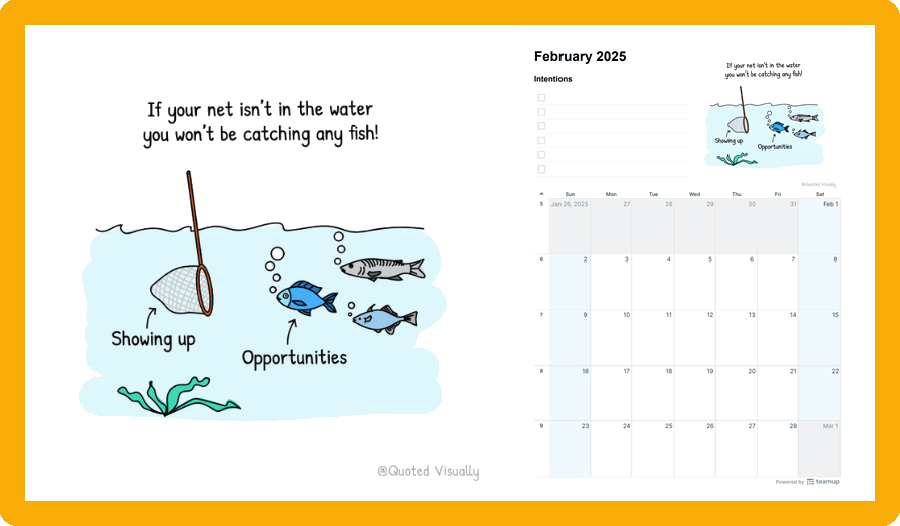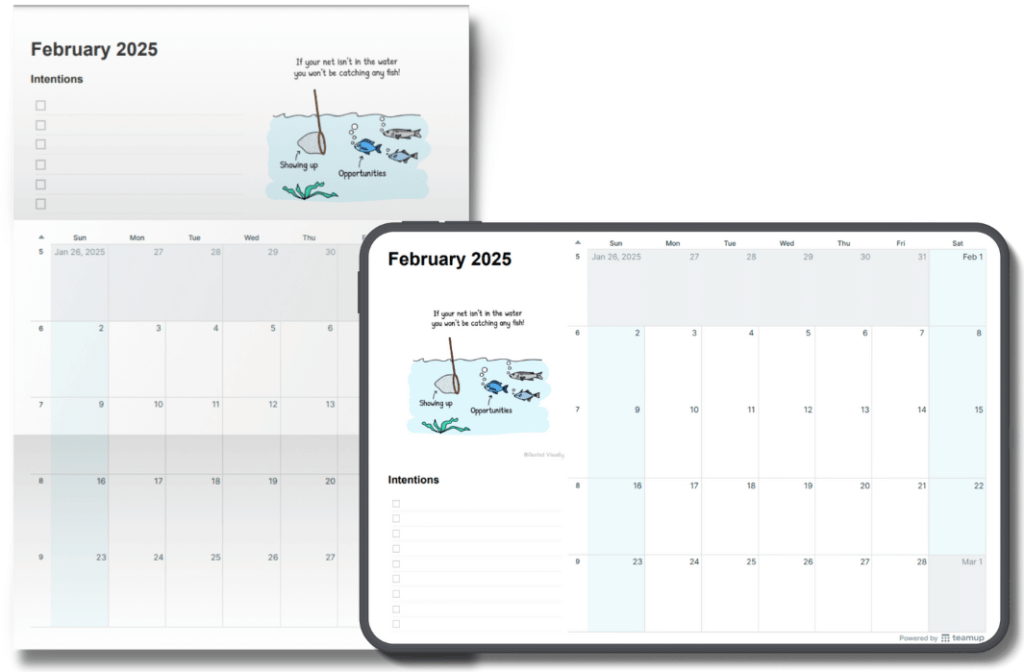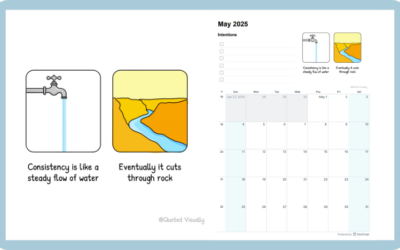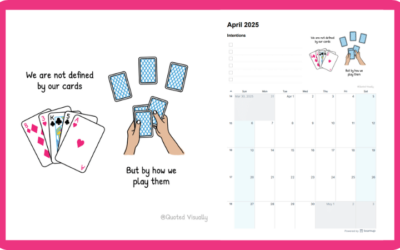If your net isn’t in the water, you won’t be catching any fish. Stay motivated with our February illustrated calendar, available to download and print in portrait or landscape. See our complete collection of 2025 printable calendars for even more options.
Success—however you define it—doesn’t just happen. You have to show up, with physical presence, mental attention, and clear intentions. Everyone has a different set of opportunities and limitations, true. It’s easy to assume that those differences define us, or to credit luck, talent, or randomness with results. More often, though, what drives success is simple consistency and awareness. Here are some ways to show up, pay attention, and stay ready to engage with what’s in front of you, even when circumstances aren’t perfect.
Show up by knowing your priorities
You can’t do everything, and trying will burn you out. When all tasks seem important, none truly are, which leads to poor results: Mediocre outcomes and constant stress. To avoid spreading yourself so thin there’s nothing left, first you have to face the tough truth about your own limitations. Our reality provides us with more information and options than we can ever process in a single lifetime. So setting your own priorities is key. By focusing on what matters most to you, you can move forward with a clear mind, and make real progress instead of running in circles.
- Identify key actions. Keep track of where your time goes for a few days, then review and identify the actions that add the most value and enjoyment to your work and life.
- Use the 80/20 Rule. Focus on the 20% of tasks, relationships, or goals that drive 80% of your results.
- Say no to distractions. Just because something could be useful doesn’t mean it’s worth your time. (More on this in the next section.)
- Choose three priority items each day. Clarity beats busywork every time.
Show up by eliminating distractions
Being somewhere physically isn’t enough. If your mind is elsewhere, you lose a lot of the benefit and miss what’s really going on. Even when it comes to physical exercise, being mentally present leads to better results.
Distractions can stretch simple tasks and weaken your involvement in conversations. And when you’re only half-there, you lose the opportunity to make connections or dip into creative flow. On the other hand, when you focus fully, you get into a rhythm, build better connections, and feel more satisfied with what you accomplish.
- Start saying Not Now. You can’t always eliminate distractions, but you can usually delay them. Deal with things on your own timeline.
- Time-block your day. Set specific windows for deep work, meetings, and breaks. Give yourself buffer time to process or transition between big blocks.
- Turn off notifications. Use focus mode settings and reduce interruptions.
- Create a shutdown routine. At the end of the workday, process notes, finalize communication, and set up your priority tasks for the next day.
Show up by working in your strengths
Doing everything yourself is a good way to waste your energy. Spending too much time on tasks that aren’t your strengths can make you frustrated and slow. Instead, focus on what you do best. Work becomes easier, results improve, and you enjoy the process more. Knowing your strengths helps you collaborate better, since you have clarity on what you can offer, how you can lead, and when you need to ask for help.
- Identify your strengths. Use tools like CliftonStrengths or reflect on what comes easily to you. Ask for feedback to get a complete picture.
- Categorize tasks. Sort your regular tasks into groups based on how well they fit into your strengths. Try color-coding on your calendar to get an idea of which group gets most of your time, then adjust to shift more attention to your best tasks.
- Delegate and collaborate. Hand off what drains you so you can focus on what you do best. Look for ways to partner on projects so everyone is more effective.
Show up by being present
Most opportunities don’t come from job boards or luck—they come from relationships. But people can tell when you’re distracted, bored, or just waiting for your turn to talk. When you’re fully engaged, you build trust, spot chances to help others, and open doors you didn’t even know existed. If you’re always checked out, you miss those moments.
- Practice active listening. Ask open-ended questions and resist the urge to jump in with advice.
- Put away your phone. Silence it, flip it over, or leave it in another room.
- Follow up. A quick message after a conversation shows you were paying attention and builds real connections.
- Lean into curiosity. Go into each interaction wondering what will result and how great things can happen for everyone, instead of focusing only on your own agenda.
Show up by being consistent
Success isn’t about big moves; it’s about small, steady actions over time. If you only show up when you feel like it, you’ll keep starting over. Consistency builds momentum, trust, and skill. People who reach their goals and do meaningful work aren’t always the most talented. Often, they’re simply the people who learned how to push through times of low motivation. Showing up consistently to contribute however you can enables you to build value in both your professional life and personal relationships.
- Build small daily habits. Review your priorities and choose easy actions you can repeat daily to keep you on track.
- Commit to small wins. Tiny progress beats grand, unsustainable plans. Break down big projects, establish milestones, and focus on steady small steps forward.
- Collect streaks. Don’t strive for perfection; Reality will always give you new surprises and obstacles. Instead, collect streaks of habitual action and forward movement. When there’s a break, just start working on the next streak.
Show up for success
You don’t have to be everywhere at once. But you do need to be in the right place, fully engaged. Cultivate the habit of asking yourself a simple question: What matters right now? Then focus fully on the answer. Showing up and being open is what matters. Keep your net in the water, so those opportunities for growth, meaning, and connection can find you.




